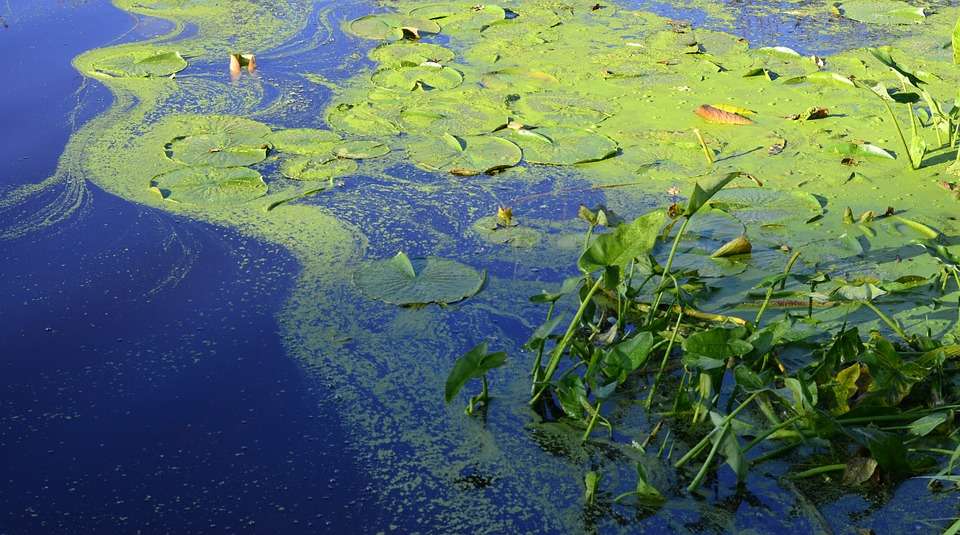
The Kansas Department of Health and Environment (KDHE) and the Kansas Department of Wildlife and Parks (KDWP) have issued several public health advisories for Kansas lakes due to blue-green algae.
Milford Lake Zones B and C are on Warning level due to very high toxin levels in samples collected 8/30/2021. These toxins can be absorbed by ingestion, inhalation of aerosols and even skin contact. Children and dogs are more susceptible to toxin exposure. Blue-green algae blooms are unpredictable, and conditions can change quickly. All lake visitors should use caution and remain vigilant. The Milford State Park Splash Pad offers a safe recreation option for lake visitors throughout the season.
Active Advisories
Warning
Altamont City Lake "Idle Hour" - North Lake, Labette County
Colwich City Lake, Sedgwick County
Gathering Pond at Milford, Geary County
Harvey County East Lake, Harvey County
Jerry Ivey Pond, Saline County
Lake Afton, Sedgwick County
Marion County Lake, Marion County
Marion Reservoir, Marion County
Melvern Outlet Pond, Osage County
Melvern Outlet Swim Pond, Osage County
Milford Lake Zones A, B and C, Geary/Dickinson/Clay Counties
Neosho Co SFL, Neosho County
Riverwalk Landing Pond, Geary County (elevated Sept. 16)
South Lake, Johnson County
Watch
Altamont City Lake "Idle Hour" - Main Lake, Labette County
Big Eleven Lake, Wyandotte County
Cheney Lake, Reno County (new)
Ford County Lake, Ford County
Hodgeman Co SFL, Hodgeman County (lowered Sept. 16)
Lake Jeanette, Leavenworth County
Pony Creek Lake, Brown County
Webster Reservoir, Rooks County
Advisories Lifted 9/16/21
Buhler City Lake, Reno County
Roses Lake, Johnson County
A Warning status indicates that conditions are unsafe for human and pet exposure. Contact with the waterbody should be avoided.
When a warning is issued, KDHE recommends the following precautions be taken:
- Lake water is not safe to drink for pets or livestock.
- Lake water, regardless of blue-green algae status, should never be consumed by humans.
- Water contact should be avoided.
- Fish may be eaten if they are rinsed with clean water and only the fillet portion is consumed, while all other parts are discarded.
- Do not allow pets to eat dried algae.
- If lake water contacts skin, wash with clean water as soon as possible.
- Avoid areas of visible algae accumulation.
A Watch status means that blue-green algae have been detected and a harmful algal bloom is present or likely to develop. People are encouraged to avoid areas of algae accumulation and keep pets and livestock away from the water.
During the watch status, KDHE recommends the following precautions be taken:
- Signage will be posted at all public access locations.
- Water may be unsafe for humans/animals.
- Avoid areas of algae accumulation and do not let people/pets eat dried algae or drink contaminated water.
- Swimming, wading, skiing and jet skiing are discouraged near visible blooms.
- Boating and fishing are safe. However, inhalation of the spray may affect some individuals. Avoid direct contact with water, and wash with clean water after any contact.
- Clean fish well with potable water and eat fillet portion only.
KDHE investigates publicly-accessible bodies of water for blue-green algae when the agency receives reports of potential algae blooms in Kansas lakes. Based on credible field observation and sampling results, KDHE reports on potentially harmful conditions.
If you observe a scum or paint-like surface on the water, small floating blue-green clumps or filaments in the water, or if the water is an opaque green, avoid contact and keep pets away. These are indications that a harmful bloom may be present. Pet owners should be aware that animals that swim in or drink water affected by a harmful algal bloom or eat dried algae along the shore may become seriously ill or die.
For information on blue-green algae and reporting potential harmful algal blooms, please visit www.kdheks.gov/algae-illness/index.htm.



